Children Learn Through Play
As a grandma, or an aunt, or a grandma figure to someone else’s children, you may already be aware that child play is how children learn. But have you ever wondered about the best ways to enhance that child’s play time for better brain development? Especially with some of us having limited time or visit opportunities due to living in different cities. I found myself wondering how to have both fun and learning time together with my grandchildren to maximize the most positive experiences and have the best impact on their future as well.
Our Grandma Role
In my Mind, Money, Motion business, the focus on a healthy mind includes both brain health and a positive mindset. So as we become grandmothers, our relationship with our family expands to our grandchildren where we want to role model and enjoy a positive mindset as well. So I am expanding my blog and podcast focus to incorporate helpful information that we may already apply or want to start incorporating into our grandmother roles since that is so important and top of mind for many of us.
The Idea of Grandma School
My grandchildren are all under 10 years of age right now so they are in what I refer to as the “sponge” ages when their brains tend to be super “absorbent” to sensory experiences around them. So you can imagine my delight when I met and began visiting with a wonderful grandma, Jill VandeHey Klefstad, who also happens to be a retired Professor of Early Childhood Education from the University of Wisconsin-Stout. I was fascinated when she started telling me about her “granddarlings” and “Grandma School.”
Jill’s goal with her “granddarlings” when they are together for “Grandma School” is to get them to be thinkers by fostering the joy of learning. She does that by setting the stage for learning at their own pace in an environment where they unconsciously, yet enthusiastically, learn through their play. She sets up the environment to be rich in language and includes vocabulary experiences, songs, stories, music, rhyme and open-ended art.
Making an Impact: How and Why
I asked Jill for some tips: what specifically can we do with our grandchildren and why is it so important? (NOTE: these are geared primarily for 2-5 year olds)
Idea #1
- What? See Jill’s one-page sheet for a variety of November activities.
- Why? Time spent with granddarlings gives you the opportunity to share your wisdom and knowledge and family experiences and events. Who knows, maybe Grandma’s Goodies could become keepsakes for years to come!
Idea #2
- What? Sing nursery rhymes together.
- Why? So many reasons!
- They help children experience the rhythm of language.
- They expand children’s imagination.
- Repetition encourages your granddarlings to watch, listen, and copy what they see others saying and doing.
Idea #3
- What? Making smelly playdough then moving from playdough turkeys and pumpkins to a cooking experience of making and decorating sugar cookie turkeys and pumpkins will send the children’s senses into 7th heaven.
- Why? This allows children to utilize their sense of sight, smell, and touch. Given kitchen utensils such as rolling pins, cookie cutters, spatulas and cookie sheets also develops fine motor skills and allows them to do what grandma does.
Idea #4
- What? Be intentional about the environment. Jill likes to think about the environment as a meaningfully structured learning space where everything has a purpose and a place. Whether it is your home, the granddarlings home, the yard or a park, strive to set up those learning experiences that will be interesting and challenging and allow for various levels of learning.
- Why? Having granddarlings allows a grandma to do all the things she didn’t have time to do as a mom.
The Importance of the Senses
Overall, the intentional and meaningful interaction between grandma and granddarlings allows opportunities to refine the five senses of hearing, seeing, touching, tasting, and smelling. Learning through the senses gives children information about how things work through meaningful experiences. Ah, what better time to do more of this than the holidays!
Remember that the key is to provide a balance of activities that stimulate different aspects of development while also ensuring that children have time for unstructured play and downtime. What a bonus, engaging in fun activities with them that promote cognitive, social, emotional, and physical development while also maximizing their brain development!
Watch for Part 2 and Part 3 of this series with Dr. Jill VandeHey Klefstad. She is compiling a book for grandparents, teachers, parents and anyone with a love of nurturing children and their brains. She plans to share a theme page of activities each time in this blog series so you have the What and the Why ready to use with your own granddarlings.
What simple activities have you enjoyed with your grandchildren? Have you realized the impact you are having on their development? What other questions would you have for Jill? Please share your feedback!
Marie Burns is a Certified Financial Planner, Speaker, and Author of the bestselling Financial Checklist books. Find Marie on Facebook or contact her at [email protected]
This article was first published at 60 and Me – a community that helps women over 60 live happy, healthy and financially secure lives.

